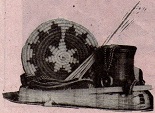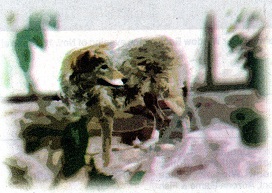Saad Bee Ál’íní (Alphabet)
A, B, Ch, Ch’, D, Dl, Dz, E, G, Gh, H, Hw, I, J, K, K’, Kw, L, Ł,
M, N, O, S, Sh, T, T’, Tł, Ts, Ts’, W, X, Y, Z, Zh, ’ (glottal stop)
|
|
Yá’át’ééh Marilyn Dempsey dashijní. Kiiyaa’áanii nishłí̜. Tó Dích’íi’nii báshíshchíín. Dibéłzhíní éí dashicheii. Hónágháahnii éí dashinálí. Kót’éego asdzá̜á̜ nishłí̜.

The Diné Bizaad page’s purpose is to provide an introduction to our indigenous language. Our language has been spoken by our people throughout time to communicate with one another, to sing, to pray, to express thoughts, and to think, plan, live, and reflect on our lives. Our great grandfather and leader, Chief Manuelito was quoted, “Shikéí, shidine’é, ałtah háási̜i̜łgóó… háadida léi’ nihizaad, nihisodizin, ádóone’é niidlínígíí dóó nihe’á’ál’í̜ nihił ch’aa wóle’ sha’áłchíní, hosídoolí̜i̜ji̜’, sidoołdee’ji̜’…” His words should not be forgotten and left by the wayside. So, it is up to each one of us to revitalize and maintain our dying language.
Indigenous languages have been utilized in wars of the United States. Our Diné language was used to win a war for this country. Just as the Code Talkers used our language as a weapon, we too must use our language as a weapon to protect our Diné Culture and values.
Diné Bizaad is one of the few indigenous languages left. We have not lost it all yet. Out of hundreds of indigenous languages pre-Columbus, there are less than 100 indigenous languages left that are spoken today.
Language is essential to the survival of a culture. Language and culture is essential to one’s self-identity, self-esteem, foundation, and success in life.
|
Dinék’ehjí̜ Na’nitin
|
Dinék’ehjí na’nitin éí hóló̜. Hóózhó̜ó̜jí̜ na’nitin dóó Naayéé’eek’ehjí̜ na’nitin hóló̜. Amásání dóó Acheii dóó amá dóó azhé’é dóó ak’éí Danilínígíí éí nida’nitin łeh. T’áá ákwíí jí̜ éí t’áadoo le’é bíhwiidoo’ááłígíí hóló̜.
Há’áhwiinít’í͔i͔go nijigháago ál’í͔. Há’áhwiinít’í͔i͔go éí diné t’áá ałtso yá’át’ééh dóó k’é bijiníi łeh Há’áhwiinít’í͔i͔go éí diné bich’i͔’ há hózhó̜o̜ łeh. Há’áhwiinít’í͔i͔go éí diné saad yá’át’ééhígíí bee bich’i̜’ yájíłti’ łeh.
|
Há’áhwiinít’í͔i͔go saad áhashinee’ jiníigo bee yájíłti’ łeh. Há’áhwiinít’í͔i͔go saad bee hada’ahóníinii bee yájíłti’ łeh.
Ma’ii joodloshí éí haigo t’éiyá baa dahane’. Haigo éí naaldlooshii baa dahane’ígíí da’ałhosgo biniinaa éí haigo t’éiyá baa dahane’. T’áá nináhah baa hane’. Díí hane’ éí bits’á̜á̜dóó na’nitin hóló̜ dóó hane’ baa hane’ bóhoo’aah.
|
|
Ma’ii dóó Na’ashó̜’ii Dich’ízhii
 Łah shí̜í̜ éí Ma’ii yildlosh jiní. Ma’ii dichin nízingo shí̜í̜ yildlosh nít’éé’ naadá̜á̜’ yil’áágóó yitah yílwod jiní. Áko shí̜í̜ Na’ashó̜’ii Dich’ízhii bidá’ák’ehgi shí̜í̜ át’í̜í̜ lá. Naadá̜á̜’ daneest’á̜á̜ léi’ yíl’á jiní. Ákwe’é Na’ashó̜’ii Dich’ízhii binaadá̜á̜’ yik’i náhágod lá jiní. “Haalá áhánééh shił naa’aash?” ní jiní Ma’ii. “Dooládó’ ná’níníłt’á̜a̜ da lá,” náádí’ní jiní. Áádóó shí̜í̜ ábijiní, “Díí yee’ ayóo bina’anish.” “Tó bił neheshkaah1 dóó bik’i náháshgodgo naadá̜á̜’ náníłt’á̜,” ní jiní Na’ashó̜’ii Dich’ízhii. Áádóó shí̜í̜ Na’ashó̜’ii Dich’ízhii naadá̜á̜’ ła’ yiyííti̜’ dóó Ma’ii naadá̜á̜’ yá yist’é. Ma’ii naadá̜á̜’ bich’i̜’ niiká̜a̜go t’óó yił ahíznod jiní. “Dooládó’ naadá̜á̜’ łikan da. Ła’ sha’níłtsóód,” hałní jiní. Áádóó shí̜í̜ Na’ashó̜’ii Dich’ízhii, “Dooda!” ní jiní. Ma’ii éí ná’ooka̜a̜hgo yaa nídiidzá jiní. “T’áá sho̜o̜dí,” hałníigo ná’ooka̜a̜h jiní. Dí̜i̜’di ná’ásdlí̜i̜’go t’óó ahóółna’ jiní.
Łah shí̜í̜ éí Ma’ii yildlosh jiní. Ma’ii dichin nízingo shí̜í̜ yildlosh nít’éé’ naadá̜á̜’ yil’áágóó yitah yílwod jiní. Áko shí̜í̜ Na’ashó̜’ii Dich’ízhii bidá’ák’ehgi shí̜í̜ át’í̜í̜ lá. Naadá̜á̜’ daneest’á̜á̜ léi’ yíl’á jiní. Ákwe’é Na’ashó̜’ii Dich’ízhii binaadá̜á̜’ yik’i náhágod lá jiní. “Haalá áhánééh shił naa’aash?” ní jiní Ma’ii. “Dooládó’ ná’níníłt’á̜a̜ da lá,” náádí’ní jiní. Áádóó shí̜í̜ ábijiní, “Díí yee’ ayóo bina’anish.” “Tó bił neheshkaah1 dóó bik’i náháshgodgo naadá̜á̜’ náníłt’á̜,” ní jiní Na’ashó̜’ii Dich’ízhii. Áádóó shí̜í̜ Na’ashó̜’ii Dich’ízhii naadá̜á̜’ ła’ yiyííti̜’ dóó Ma’ii naadá̜á̜’ yá yist’é. Ma’ii naadá̜á̜’ bich’i̜’ niiká̜a̜go t’óó yił ahíznod jiní. “Dooládó’ naadá̜á̜’ łikan da. Ła’ sha’níłtsóód,” hałní jiní. Áádóó shí̜í̜ Na’ashó̜’ii Dich’ízhii, “Dooda!” ní jiní. Ma’ii éí ná’ooka̜a̜hgo yaa nídiidzá jiní. “T’áá sho̜o̜dí,” hałníigo ná’ooka̜a̜h jiní. Dí̜i̜’di ná’ásdlí̜i̜’go t’óó ahóółna’ jiní.
Ma’ii dá’ák’ehgóó yílwod dóó naadá̜á̜’ yé̜e̜ yita’ałháashgo yitah tádílyeed jiní. “Dooládó’ shinaadá͔á͔’ łikan da,” níigo naadá͔á͔’ jóbída yee ádíhoosníí’ jiní. Haashí͔í͔ nízah nihóólzhiizhgo índa nániichaadgo dá’ák’eh yiba̜a̜hgóó neeztí̜ jiní. Háágóóshí̜í̜ nániichaadgo bibid yínídi̜lnihgo tsiyaagóó tsédei sití̜ jiní. Hodíina’ nít’éé’ gáagii dá’ák’ehdi ádaaní yiits’a’ jiní. Ma’ii náhidiitah dóó gáagii yich’i̜’ dilwosh jiní. “Gáagii, gáagii, níwohji̜’ oohjeeh. T’áadoo shinaadá̜á̜’ baa nídaoht’íní. Éí yee’ yéego baa naanish shiisxí̜2,” ní jiní. Ma’ii hazhó’ó náneeztí̜.
Na’ashó̜’ii Dich’ízhii éí Ma’ii bibid góne’ sidáago, “Haalá yit’éego háádeeshááł?” nízingo yaa nitsékees. Áádóó Na’ashó̜’ii Dich’ízhii Ma’ii bibid biyi’dé̜é̜’, “Shiiid...,” yiłní jiní. Ma’ii deesyiz dóó háágóóshí̜í̜ naazgal. “Háí lá ání?” nízingo ch’ééh naazgal. Na’ashó̜’ii Dich’ízhii dí̜i̜’di, “Shiiid…” náádoo’niidgo índa bibid biyi’dé̜é̜’ íits’a’go yaa ákoniizí̜í̜’. “Da’ níísh ádíníí lá, shił naa’aash?” ní jiní.
Na’ashó̜’ii Dich’ízhii shí̜í̜, “Aoo’, shí ádíshní,” ní jiní.
 Áádóó shí̜í̜ Na’ashó̜’ii Dich’ízhii Ma’ii bibid góne’ sidáago t’áadoo le’é yidadilchid, “Díí lá ha’át’íí át’é?” níigo Ma’ii bitsá͔ siláii yidadilchid. Ma’ii, “Shijéí díshjool dóó shizid dóó shich’í͔í͔’,” da níigo yaa halne’ jiní. Áádóó akée’di éí Ma’ii bijéí Na’ashó̜’ii Dich’ízhii yits’á͔á͔’ yidínées’í͔í͔’ jiní. Na’ashó̜’ii Dich’ízhii ch’ééh yína’ídíłkidgo Ma’ii éí, “T’óó shibee anildiní át’é,” nídí’niih jiní. Dí͔i͔’di ná’ásdlí͔i͔’go índa t’áá na’níle’dii Ma’ii ání jiní, “Shijéí át’é!”
Áádóó shí̜í̜ Na’ashó̜’ii Dich’ízhii Ma’ii bibid góne’ sidáago t’áadoo le’é yidadilchid, “Díí lá ha’át’íí át’é?” níigo Ma’ii bitsá͔ siláii yidadilchid. Ma’ii, “Shijéí díshjool dóó shizid dóó shich’í͔í͔’,” da níigo yaa halne’ jiní. Áádóó akée’di éí Ma’ii bijéí Na’ashó̜’ii Dich’ízhii yits’á͔á͔’ yidínées’í͔í͔’ jiní. Na’ashó̜’ii Dich’ízhii ch’ééh yína’ídíłkidgo Ma’ii éí, “T’óó shibee anildiní át’é,” nídí’niih jiní. Dí͔i͔’di ná’ásdlí͔i͔’go índa t’áá na’níle’dii Ma’ii ání jiní, “Shijéí át’é!”
Na’ashó̜’ii Dich’ízhii éí bibéézh hayíí’á͔á͔ dóó Ma’ii bijéí k’íinígizh. Áádóó Ma’ii naa’íítłizh dóó Na’ashó̜’ii Dich’ízhii Ma’ii yizéé’dé̜é̜’ hanáá’na’. Na’ashó̜’ii Dich’ízhii bidá’ák’ehgóó naaswod nít’éé’ Ma’ii naadá̜á̜’ ałtso’ yik’inaasna’ dóó naadá̜á̜’ ałtso yitah ashhazh lá jiní.
Éí shí̜í̜ biniinaa diné naalnishgo doo baa níjít’í̜i̜ da.
|
|
Diné bina’nitin
(words for traditional teaching)
|
|
Na’nitin – teachings
|
Saad bee hada’ahóníinii – words of encouragement
|
|
Hóózhó̜ó̜jí̜ na’nitin – Blessing Way teachings
|
Na’ashó̜’ii Dich’ízhii – horned toad
|
|
Há’áhwiinít’í̜- to have respect and to be cordial
|
Gáagii – crow
|
|
Há hózhó̜ – to have a pleasant nature
|
Dá’ák’eh – corn field
|
|
Saad áhashinee’ – words of affection
|
Ma’ii joodloshí baa hane’ – Coyote Stories
|
Saad Bóhoo’aah
|
Fill in the blank with the missing word. Practice using Diné words every day.
|
|
Na’nitin
|
Dinék’ehjí __________ t’óó ahayóí.
(There are many Diné teachings.)
|
|
Hóózhó̜ó̜jí̜ na’nitin
|
__________ hoł bééhózingo yá’át’ééh.
(It is good to know the Blessing Way teachings.)
|
|
Há’áhwiinít’í̜
|
__________ éí Hózhó̜ó̜jí̜ na’nitin át’é.
(Having respect and being cordial is a Blessing Way teaching.)
|
|
Há hózhó̜
|
__________ nijigháago yá’át’ééh. (It is good to have a pleasant nature.)
|
|
Saad áhashinee’
|
Shimá __________ yee yáłti’.
(My mother speaks words of affection.)
|
|
Saad bee hada’ahóníinii
|
__________ diné bee bich’i̜’ yájíłti’go yá’át’ééh.
(It is good to give words of encouragement.)
|
|
Na’ashó̜’ii Dich’ízhii
|
__________ éí ałts’íísí. (Horned toad is small.)
|
|
Gáagii
|
__________ éí daalzhin. (Crows are black.)
|
|
Ma’ii
|
__________ éí łibáa łeh. (Coyotes are usually gray.)
|
|
Dá’ák’eh
|
__________di éí naadá̜á̜’ hóló̜.
(There is corn at the corn field.)
|
Ma’ii joodloshí baa hane’
|
__________go ayóo bóhoneedlí̜.
(It is fun to hear coyote stories.)
|
|
